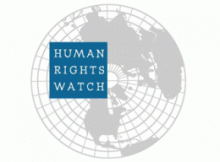
Written by Joshua Kern (9 Bedford Row)
In the field of international criminal law, international human rights organisations such as Human Rights Watch (HRW) are hugely influential. Time and again, litigation at the ICTY, ICTR and ICC has shown that NGO reporting forms the legal and factual building blocks of prosecutions at the international criminal tribunals. It has been suggested that such content can contribute to the formation of customary international law; in her dissent in Arrest Warrant, Judge van der Wyngaert opined that ‘the opinion of civil society… cannot be completely discounted in the formation of customary international law today.’ But international law is based on the common consent of states. There is a need to guard against developing a jurisprudence which is the desirable product of interest and agenda, as opposed to identifying rules which are sufficiently supported by state practice and opinio juris.
With respect to the conflict between Israel and the Palestinians, HRW routinely condemns Israeli state policy as disproportionate and discriminatory. Yet HRW itself perpetuates myths, presented as law and fact, which in turn are argued to constitute human rights violations by the State of Israel.
Take, for example, HRW’s treatment of the “right of return” – asserted by the Palestinians, but a claim which Israel demurs. Close examination is warranted as although its reclamation was the express objective of The Great March of Return protests held at the Gaza border between 30 March and 14 May, the right of return’s existence under international law is disputed.
HRW’s conceives of a “right of return” which extends to refugees following the 1948 War of Independence, or the Nakba, as well as to Palestinian refugees of the Six Day War. It relies on legal and human rights arguments, and presents UN General Assembly Resolution 194 (III) of 11 December 1948 in support. But the resolution’s terms are recommendatory and not binding. On its own terms, it applies only to those who wish to “live at peace with their neighbours”. Hamas PM Yahya Sinwar described the aim of attempts to breach the Gaza border as follows: “We will take down the border and we will tear out their hearts from their bodies”. On any interpretation, UNGA Resolution 194 (III) does not give rise to a right of return.
HRW adopts a wider definition of “refugee” than contemplated by the 1951 Convention, including refugees’ and displaced persons’ descendants. It gives scant consideration to Jews and their descendants who claimed asylum in Israel after their expulsion from Arab states post-1948. Do they have a right of return too, or a right of compensation? How are their rights to be protected and effective following a peace settlement?
At the political level, HRW fails to acknowledge that return of the 1948 refugees would mean the end of the two-state solution as we know it. Demographically, it would signal the end of a Jewish majority in Israel and the end of Israel either as a Jewish or as a democratic state. Israel can never agree – it would be destroying the very essence of itself were it to do so.
HRW’s approach is one-sided. Why is this?
Perhaps there is a tension between HRW’s interest in the promotion and support of individual rights and the interests of states such as Israel (or India, or Pakistan, or Saudi Arabia, or many others) whose constitution protects specific groups. The Palestinian struggle has come to represent international human rights advocates’ concern to protect the rights of the individual against the oppression of a stronger group.
Why this campaign is so often directed against Israel (as opposed to any other national-religious state) is a discussion for another day. But, perhaps because it focuses so religiously on protection of the individual, HRW fails to appreciate that societies need also to protect the group. International criminal law, which protects group rights through (for example) criminalising genocide and its incitement, recognises this. Israel has not forgotten it. Protection of the group is Israel’s raison d’etre. It is what “never again” means.
For Israel, the IDF’s actions at the Gaza border are nothing less than genocide prevention – “never again” in motion. The Hamas leadership’s genocidal intent is clear and unequivocal. It is reasonable to infer, were Hamas operatives to have breached the border, they would both have shared its genocidal intent, and have the means to act upon it. Whether viewed through the lens of the law of armed conflict or of international human rights law, any proportionality analysis must take into account a margin of appreciation to be afforded to a state with respect to the prevention of genocide against its own citizens. HRW fails to acknowledge this, and so is blind to the nature of these stakes for Israel.
On its own terms, HRW’s position with respect to Israel has to be seen for what it is – pursuit of its agenda, namely respect for the dignity of each human being. This is undoubtedly noble, but it can conflict with Israel’s – to protect the group from genocide. Perhaps it is from this conflict that an unconscious bias against Israeli policy arises? It is one reason why HRW’s contributions on the Israeli-Palestinian conflict must be treated with caution.
Image source: slulibrary.saintleo.edu
The views expressed in this piece are those of the author and do not represent the viewpoints of 9 Bedford Row or 9 Bedford Row International.
